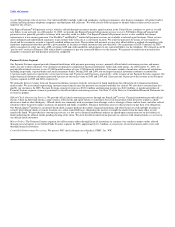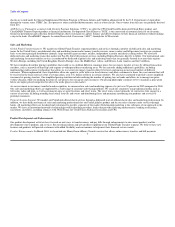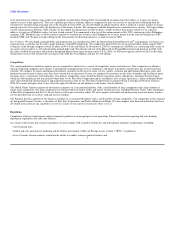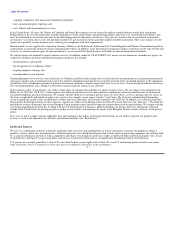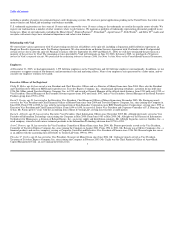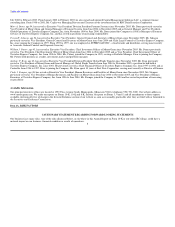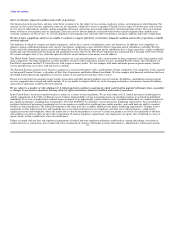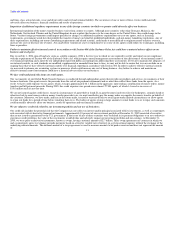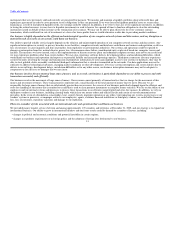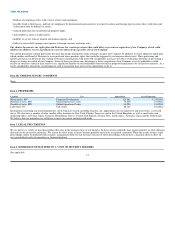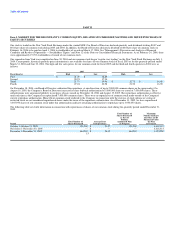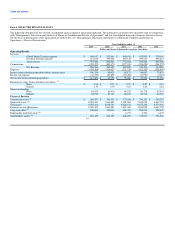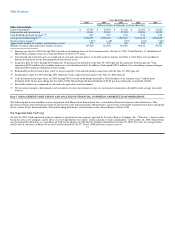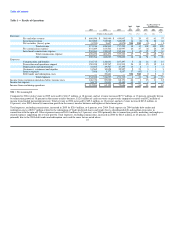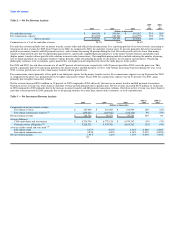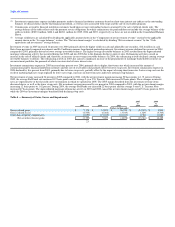MoneyGram 2005 Annual Report Download - page 16
Download and view the complete annual report
Please find page 16 of the 2005 MoneyGram annual report below. You can navigate through the pages in the report by either clicking on the pages listed below, or by using the keyword search tool below to find specific information within the annual report.
Table of Contents
instruments that were previously sold and currently are presented for payment. We monitor and maintain a liquidity portfolio along with credit lines and
repurchase agreements in order to cover payment service obligations as they are presented. If we were forced to liquidate portfolio assets or secure other
financing as a result of unexpected liquidity needs, our earnings could be reduced. In addition, if we were to lose any of our significant customers, in addition
to losing the related revenues, we may have to liquidate investments or seek to borrow for a period of time to fund our obligation to clear the outstanding
instruments issued on behalf of that customer at the termination of its contract. We may not be able to plan effectively for every customer contract
termination, which could result in sale of investments at a loss of or lower profits than we would otherwise realize due to prevailing market conditions.
Our business is highly dependent on the efficient and uninterrupted operation of our computer network systems and data centers, and any disruption or
material breach of security of our systems could harm our business.
Our ability to provide reliable service largely depends on the efficient and uninterrupted operation of our computer network systems and data centers. Any
significant interruptions or security or privacy breaches in our facilities, computer networks and databases could harm our business and reputation, result in a
loss of customers or cause inquiries and fines or penalties from regulatory or governmental authorities. Our systems and operations could be exposed to
damage or interruption from fire, natural disaster, power loss, telecommunications failure, unauthorized entry or physical break-ins, computer viruses and
hackers. The measures we have enacted, such as the implementation of disaster recovery plans and redundant computer systems, may not be successful and
we may experience problems other than system failures. We may also experience software defects, development delays and installation difficulties, which
would harm our business and reputation and expose us to potential liability and increased operating expenses. Third-party contractors also may experience
security breaches involving the storage and transmission of proprietary information. If users gain improper access to our systems or databases, they may be
able to steal, publish, delete or modify confidential third-party information that is stored or transmitted on the networks. Our data applications may not be
sufficient to address technological advances, changing market conditions or other developments. If we face system interruptions and system failures due to
defects in our software, development delays, installation difficulties or for any other reason, our business interruption insurance may not be adequate to
compensate us for all losses or damages that we may incur.
Our business involves the movement of large sums of money, and, as a result, our business is particularly dependent on our ability to process and settle
transactions accurately and efficiently.
Our business involves the movement of large sums of money. Our revenues consist primarily of transaction fees that we charge for the movement of this
money and investment revenues. These transaction fees represent only a small fraction of the total amount of money that we move. Because we are
responsible for large sums of money that are substantially greater than our revenues, the success of our business particularly depends upon the efficient and
error-free handling of the money that is remitted to us and that is used to clear payment instruments or complete money transfers. We rely on the ability of our
employees and our internal systems and processes to process these transactions in an efficient, uninterrupted and error-free manner. In addition, we rely on
third-party vendors in our business, including clearing banks which clear our money orders and official checks and certain of our telecommunications
providers. In the event of a breakdown, catastrophic event, security breach, improper operation or any other event impacting our systems or processes or our
vendors' systems or processes, or improper action by our employees, agents, customer financial institutions or third party vendors, we could suffer financial
loss, loss of customers, regulatory sanctions and damage to our reputation.
There are a number of risks associated with our international sales and operations that could harm our business.
We provided money transfer services between and among approximately 170 countries and territories at December 31, 2005, and our strategy is to expand our
international business. Our ability to grow in international markets and our future results could be harmed by a number of factors, including:
• changes in political and economic conditions and potential instability in certain regions;
• changes in regulatory requirements or in foreign policy and the adoption of foreign laws detrimental to our business;
13


